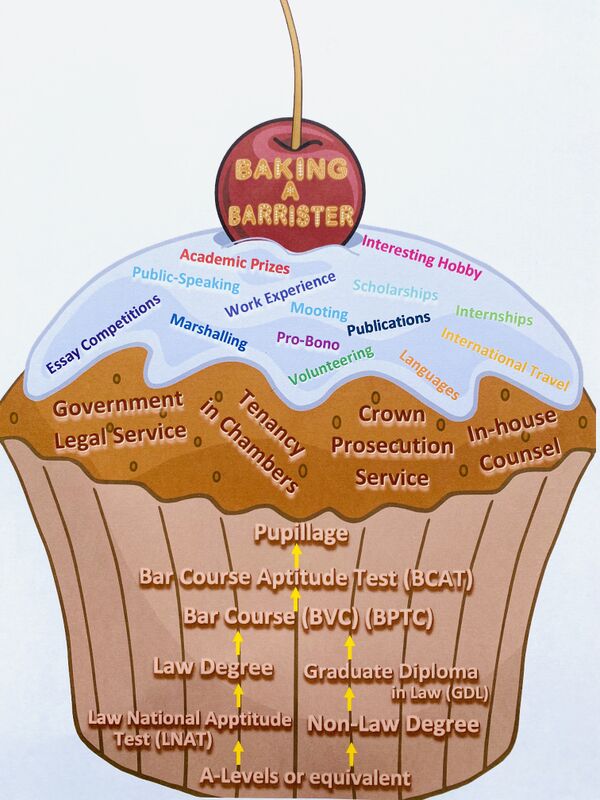Difference between revisions of "Baking a barrister"
From Learnmore
| (6 intermediate revisions by the same user not shown) | |||
| Line 19: | Line 19: | ||
The emerging lawyer within me urges you to read on with the caveat in mind that this is not a fool-proof recipe and the outcome is of course not guaranteed. If anyone has ever tried to follow a Pinterest or any other recipe, you will be well aware that baking is an art and definitely not an exact science! | The emerging lawyer within me urges you to read on with the caveat in mind that this is not a fool-proof recipe and the outcome is of course not guaranteed. If anyone has ever tried to follow a Pinterest or any other recipe, you will be well aware that baking is an art and definitely not an exact science! | ||
| − | [[Image:CareersBakingBarristerCake.jpg|600px]] | + | [[Image:CareersBakingBarristerCake.jpg|600px|centre]] |
| Line 43: | Line 43: | ||
There are now two ways that you can study your Bar Course: either as a one-part course or a two-part course. The one-part course is the traditional model where you pay one fee at the outset of your course to be taught your compulsory modules full time or part time with exams after each module. The two-part course allows you to pay for and study the theory part of the course first (this can be distant learning depending on the program you choose), and then take the second practical part of the course only once you have completed and passed the exams from the first. This latter option can be a more flexible and cost-effective way of studying for The Bar exams. More information on this can be found here on the Bar Standards Board (BSB) [https://www.barstandardsboard.org.uk/training-qualification/becoming-a-barrister/vocational-component/aetos-from-2020.html website]. Just as with your undergraduate degree, the higher the results in your Bar Course, the more impressive it will look on your academic profile. | There are now two ways that you can study your Bar Course: either as a one-part course or a two-part course. The one-part course is the traditional model where you pay one fee at the outset of your course to be taught your compulsory modules full time or part time with exams after each module. The two-part course allows you to pay for and study the theory part of the course first (this can be distant learning depending on the program you choose), and then take the second practical part of the course only once you have completed and passed the exams from the first. This latter option can be a more flexible and cost-effective way of studying for The Bar exams. More information on this can be found here on the Bar Standards Board (BSB) [https://www.barstandardsboard.org.uk/training-qualification/becoming-a-barrister/vocational-component/aetos-from-2020.html website]. Just as with your undergraduate degree, the higher the results in your Bar Course, the more impressive it will look on your academic profile. | ||
| − | |||
''12 x Qualifying sessions'' | ''12 x Qualifying sessions'' | ||
| Line 53: | Line 52: | ||
This is the crème de la crème of your recipe, the very ingredient that pulls everything together and the most difficult of the ingredients to acquire! This is the year in which you will actually establish yourself as a barrister. Six months being guided by and assisting your pupil master, and a second six finding your own two feet in court! | This is the crème de la crème of your recipe, the very ingredient that pulls everything together and the most difficult of the ingredients to acquire! This is the year in which you will actually establish yourself as a barrister. Six months being guided by and assisting your pupil master, and a second six finding your own two feet in court! | ||
| − | ''A good helping of Motivation, Dedication and Perspiration, in equal unsparing amounts'' | + | ''+ A good helping of Motivation, Dedication and Perspiration, in equal unsparing amounts'' |
| + | |||
'''To make you an excellent barrister (the toppings):''' | '''To make you an excellent barrister (the toppings):''' | ||
| Line 66: | Line 66: | ||
''Published articles'' | ''Published articles'' | ||
| + | |||
| + | [[Image:CareersTyping.jpg|thumb|250px|right|Seek out opportunities to write]] | ||
Start a blog, write for your university or other academic journal, enter an essay competition – all of these activities will mean writing extensively about a particular area of law, meaning you will begin to acquire specialist knowledge. The more you know, the more impressively you will be able to talk about your familiarity with the law at interviews and ultimately to clients. | Start a blog, write for your university or other academic journal, enter an essay competition – all of these activities will mean writing extensively about a particular area of law, meaning you will begin to acquire specialist knowledge. The more you know, the more impressively you will be able to talk about your familiarity with the law at interviews and ultimately to clients. | ||
| Line 85: | Line 87: | ||
When Michelin star chefs choose their ingredients they are looking for the most special ingredients; similarly when chambers and eventually clients are choosing barristers they want to know that you are the very best. Having evidence therefore of coming top in your results and being awarded academic prizes throughout your journey to the Bar is one way you can show that you are hard-working, and dedicated and therefore likely to be a winner in this competitive field. | When Michelin star chefs choose their ingredients they are looking for the most special ingredients; similarly when chambers and eventually clients are choosing barristers they want to know that you are the very best. Having evidence therefore of coming top in your results and being awarded academic prizes throughout your journey to the Bar is one way you can show that you are hard-working, and dedicated and therefore likely to be a winner in this competitive field. | ||
| − | ''Marshalling'' | + | ''Marshalling'' |
| + | |||
| + | [[Image:CareersMagistratesCourt.jpg|thumb|250px|right]] | ||
| − | By far, one of the most unique and exciting experiences, is getting the opportunity to do marshalling. Think of this as a more advanced mini-pupillage; instead of shadowing a barrister, you have the opportunity to shadow a judge! I can hardly think of anything more exciting – How do I go about securing this opportunity I hear you cry? By far the most common way is through your Inns of Court, the second most common way I have heard students come about these placements: using their initiative – if there is someone in particular you would like to marshal: write to the judge – it’s a longshot but I have heard it work; particularly in local courts where students have spent their free time watching cases and seeing their favourite judges in action. | + | By far, one of the most unique and exciting experiences, is getting the opportunity to do marshalling. Think of this as a more advanced mini-pupillage; instead of shadowing a barrister, you have the opportunity to shadow a judge! I can hardly think of anything more exciting – How do I go about securing this opportunity I hear you cry? By far the most common way is through your [https://www.barcouncil.org.uk/becoming-a-barrister/students-and-graduates/school-student-inns-of-court-events-and-schemes.html Inns of Court], the second most common way I have heard students come about these placements: using their initiative – if there is someone in particular you would like to marshal: write to the judge – it’s a longshot but I have heard it work; particularly in local courts where students have spent their free time watching cases and seeing their favourite judges in action. |
''Interesting Hobbies'' | ''Interesting Hobbies'' | ||
| Line 112: | Line 116: | ||
Pour all of the above ingredients together into your CV. Mix the experiences well into your mind and bake for 4-6 years. Once the basic barrister has been baked, give some thought as to what sort of barrister you would like to be: Would you like tenancy in a Chambers? To work in-house for a company or organisation? Work for the [https://www.gov.uk/government/organisations/civil-service-government-legal-profession Government Legal Profession] (previously known as the Government Legal Service) perhaps? Or how about the [https://www.cps.gov.uk/ Crown Prosecution Service]? There are plenty of places where you could rise. Whilst you are waiting for the basic barrister to bake, set and rise; begin creating your toppings by selecting and creating your sprinkles. Ensure to choose the most colourful toppings, adding as many as you can whilst still finding time to eat, drink, sleep, and breathe. Continually apply your toppings mixture to your barrister bake until you reach your goal as a fully-fledged practicing barrister. | Pour all of the above ingredients together into your CV. Mix the experiences well into your mind and bake for 4-6 years. Once the basic barrister has been baked, give some thought as to what sort of barrister you would like to be: Would you like tenancy in a Chambers? To work in-house for a company or organisation? Work for the [https://www.gov.uk/government/organisations/civil-service-government-legal-profession Government Legal Profession] (previously known as the Government Legal Service) perhaps? Or how about the [https://www.cps.gov.uk/ Crown Prosecution Service]? There are plenty of places where you could rise. Whilst you are waiting for the basic barrister to bake, set and rise; begin creating your toppings by selecting and creating your sprinkles. Ensure to choose the most colourful toppings, adding as many as you can whilst still finding time to eat, drink, sleep, and breathe. Continually apply your toppings mixture to your barrister bake until you reach your goal as a fully-fledged practicing barrister. | ||
| + | |||
| + | ''Thanks to Jade-Amanda Laporte for this extremely comprehensive piece on 'baking a barrister'. Jade-Amanda graduated from the LLB in Legal Practice at the City Law School in July 2020 and is beginning the ICCA Bar Course in January 2021.'' | ||
| + | |||
| + | [[Category:Careers]] | ||
| + | [[Category:Section 1]] | ||
Latest revision as of 11:56, 2 November 2020
About this recipe
There is one episode of Sabrina the Teenage Witch that stands out from my childhood. Episode 6 of Season 1; the episode where Sabrina, upset by not having a date to take to a school dance, is surprised by her two witch aunts with a bag of ‘Man-Dough’, this being a bag of magical dough designed to help you bake your ‘perfect partner’. It is therefore at the impressionable age of 8 years old that I learnt a crucial life lesson: anything that you want in life can be baked; all you need is the ideal recipe and the correct ingredients.
Fast forward so many years, having attended many networking events, talks and conferences, and having spoken to and met many students and barristers at aforementioned events as well as during mini-pupillages and internships, it is not perfect partners with which my fellow bar-seeking students are so concerned but instead the ‘perfect pupillage’.
Thus, I see no reason why the very same life lesson cannot apply! Therefore, dearest readers, allow me to take the place of your magical aunts and present to you the ingredients and recipe to allow you to bake a barrister!
There are two parts to this recipe as you will see from the instructions and image below: the cake and the toppings. This will describe what you need to have and do in order to become a qualified practicing barrister in England and Wales.
Imagine for a moment you are shopping for a cupcake for yourself or a friend. What attracts you to the cupcake? Most would say the decorations: the frosting and sprinkles and various other elements that make the cake look appealing. The more visually eye-catching it is, the more likely the cake is to attract you to picking it up and buying it. Imagine for a moment, you are the cake, in the very same way; the more sprinkles you have, the more attractive you will be as a barrister to the people who will be shopping for you whether it be universities, chambers, or clients.
The ingredients
Now go back to buying the cake for a moment. Beneath those delicious looking decorations, you would hope is the very delicious-tasting cake itself. There are many different types of ingredients that can be used to make a cupcake: various flavourings, fruits, types of eggs, butters, oils, flours and so on… yet there is only one core set of wet and dry ingredients that every cake needs to have if it is going to look, smell and taste like a cake and therefore indeed be a cake! The better those ingredients, the better tasting it will be. Likewise, there are many different combinations and types of exams and routes you can take to become a barrister, but ultimately, there is still only one set of essential requirements that you need to meet to practice at The Bar. It follows therefore, that the higher you achieve those requirements, it generally follows that the better barrister you will be, and the more likely it is that you will secure your perfect pupillage.
The emerging lawyer within me urges you to read on with the caveat in mind that this is not a fool-proof recipe and the outcome is of course not guaranteed. If anyone has ever tried to follow a Pinterest or any other recipe, you will be well aware that baking is an art and definitely not an exact science!
You will need:
For the basic barrister (the base):
1 undergraduate degree (law or non-law and GDL) at class 2:2 or above.
If you haven’t decided law or otherwise, only choose Law if you would not rather study anything else. Have a think about what type of lawyer you want to be; if you are interested in Natural Sciences or Computer Science for example, that is a huge asset to the areas of Intellectual Property and in fact chambers often prefer you to have a Science background. Similarly, something like an engineering degree can be a huge asset to the field of Construction Law. Law applies to pretty much every field so if there is subject that strikes your fancy, definitely proceed with that first and come back and do a conversion to Law later. Specialist knowledge is always an advantage because expertise will always be an asset to a chambers. First and foremost, however, be sure to choose something you feel you will enjoy and do well in; it follows that the better degree you have, the better this looks on your applications.
1 x Pass mark on your Bar Course Aptitude Test (BCAT)
This is a reasoning test that tests your suitability for the Bar Course and must be taken in the months before you are due to start the vocational bar course. You can see some example questions online on the Pearson website.
1 x membership to an Inn of Court
There are only four to choose from: Inner Temple, Middle Temple, Lincoln’s Inn and Gray’s Inn. Think of them and you need to join one before you start The Bar. I would recommend visiting if you can before choosing and have a good look around on their websites at the facilities, scholarships, events and support available in each. Often there are introduction/open days throughout the academic year. Also, if you can talk to people who are already members of each to have some first-hand experiences relayed to you, that is also really helpful and can give you a good first-hand insight.
1 x Pass mark on your Bar Course (BPTC/BVC/BVS)
There are now two ways that you can study your Bar Course: either as a one-part course or a two-part course. The one-part course is the traditional model where you pay one fee at the outset of your course to be taught your compulsory modules full time or part time with exams after each module. The two-part course allows you to pay for and study the theory part of the course first (this can be distant learning depending on the program you choose), and then take the second practical part of the course only once you have completed and passed the exams from the first. This latter option can be a more flexible and cost-effective way of studying for The Bar exams. More information on this can be found here on the Bar Standards Board (BSB) website. Just as with your undergraduate degree, the higher the results in your Bar Course, the more impressive it will look on your academic profile.
12 x Qualifying sessions
Throughout your Bar Course and before you are called to the Bar, you will be required to attend 12 ‘qualifying sessions’. Your Inn of Court will give you a varied selection of these to attend, and they could include everything from advocacy weekends to, networking dinners, educational lectures to wellbeing sessions. Whatever you do – do not leave these to the last minute! In some respects they are as important as your studies and should not be overlooked!
1 x Pupillage
This is the crème de la crème of your recipe, the very ingredient that pulls everything together and the most difficult of the ingredients to acquire! This is the year in which you will actually establish yourself as a barrister. Six months being guided by and assisting your pupil master, and a second six finding your own two feet in court!
+ A good helping of Motivation, Dedication and Perspiration, in equal unsparing amounts
To make you an excellent barrister (the toppings):
At least 3 mini-pupillages
If you are going to choose one topping, let it be this one. Don’t be afraid to use this time to try new areas of law if you’re unsure what you’ll enjoy. However, if you are decided on a particular area, concentrate on that as it will look very organised on your applications and show a passion for that area of expertise.
Public Speaking/Mooting
It should almost go without saying that for a career in which you are going to be a professional advocate, any exemplars of you actually exercising your advocacy is going to show (a) that you can speak well and (b) that you enjoy doing so. Advocacy is a fine-tuned art, and you’ll always be improving – so don’t let fear of not being ‘good’ stand in the way of this one. The only way to get ‘good’ at something is to begin doing it.
Published articles
Start a blog, write for your university or other academic journal, enter an essay competition – all of these activities will mean writing extensively about a particular area of law, meaning you will begin to acquire specialist knowledge. The more you know, the more impressively you will be able to talk about your familiarity with the law at interviews and ultimately to clients.
Interesting Relevant Work Experience/Internships
It’s likely that with the long summer break or perhaps if you are having a year out to step into ‘the real world’ you will want to undertake some work experience or an internship to do. My advice here, would be that it doesn’t have to be related to the Law Profession per se; it just has just has to be ‘relevant’. Keep in mind the following question: ‘What skills/knowledge relevant to becoming a barrister will I obtain from this experience?’ when you are selecting which internships to go for.
Volunteer Work/Pro-Bono
This shows dedication to the profession, and an interest in doing legal work without the motive of being paid. Remember pro-bono will always be a part of your ongoing practice – the more experience you can get with day-to-day clients, the better!
International Travel/Work abroad
Working abroad broadens your horizons and matures your mind and encourages the sort of interpersonal skills you can only really get from putting yourself into unfamiliar and new situations. Further you will have plenty of interesting experiences to discuss at interview. It is likely that you will eventually experience a practice that involves colleagues and clients from all around the world, so showing the ability to go beyond your comfort zone is always impressive.
Scholarships/Academic Prizes
When Michelin star chefs choose their ingredients they are looking for the most special ingredients; similarly when chambers and eventually clients are choosing barristers they want to know that you are the very best. Having evidence therefore of coming top in your results and being awarded academic prizes throughout your journey to the Bar is one way you can show that you are hard-working, and dedicated and therefore likely to be a winner in this competitive field.
Marshalling
By far, one of the most unique and exciting experiences, is getting the opportunity to do marshalling. Think of this as a more advanced mini-pupillage; instead of shadowing a barrister, you have the opportunity to shadow a judge! I can hardly think of anything more exciting – How do I go about securing this opportunity I hear you cry? By far the most common way is through your Inns of Court, the second most common way I have heard students come about these placements: using their initiative – if there is someone in particular you would like to marshal: write to the judge – it’s a longshot but I have heard it work; particularly in local courts where students have spent their free time watching cases and seeing their favourite judges in action.
Interesting Hobbies
I have lost count of the amount of times I have been asked: “ but what do you do that isn’t Law?” Whilst it may seem that you have little time in between studies for anything else, the importance of an interesting hobby is often overlooked. You need to show that you are an interesting person that can also manage that work/life balance, whilst having time to be you and do the things you enjoy. Nobody wants to talk to a law robot all day every day. What are the things that you do that show your personality? It could be a sport you like playing, an unusual collection or something creative.
Languages
Not a necessity but always such a unique asset to any professional repertoire!
Optional:
Law National Aptitude Test
Needed only for Law degree applicants and only if your university requires.
Additional qualifications such as LLM; PhD'
Can be useful as a topping.
Method:
Pour all of the above ingredients together into your CV. Mix the experiences well into your mind and bake for 4-6 years. Once the basic barrister has been baked, give some thought as to what sort of barrister you would like to be: Would you like tenancy in a Chambers? To work in-house for a company or organisation? Work for the Government Legal Profession (previously known as the Government Legal Service) perhaps? Or how about the Crown Prosecution Service? There are plenty of places where you could rise. Whilst you are waiting for the basic barrister to bake, set and rise; begin creating your toppings by selecting and creating your sprinkles. Ensure to choose the most colourful toppings, adding as many as you can whilst still finding time to eat, drink, sleep, and breathe. Continually apply your toppings mixture to your barrister bake until you reach your goal as a fully-fledged practicing barrister.
Thanks to Jade-Amanda Laporte for this extremely comprehensive piece on 'baking a barrister'. Jade-Amanda graduated from the LLB in Legal Practice at the City Law School in July 2020 and is beginning the ICCA Bar Course in January 2021.




